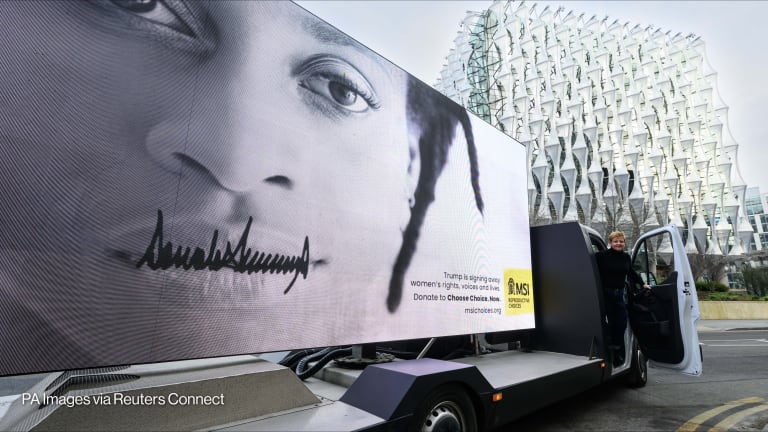India further tightens noose on critical NGOs
Nongovernmental organizations in India are bracing for the worst, concerned that proposed regulatory changes could restrict their access to foreign funding further — a move that could force some to close, Devex learns from NGOs in the country.
Nongovernmental organizations in India are bracing for the worst, concerned that proposed regulatory changes could restrict their access to foreign funding further — a move that could force some to close. And recent events only worsened their fears. After a long-running battle that saw Greenpeace India accused of “prejudicially affecting” the state’s economic interests, the country’s Ministry of Home Affairs revoked Sept. 2 the environmental group’s registration to receive foreign funding. Greenpeace India’s interim Executive Director Vinuta Gopal said the organization’s experience suggested the government was trying to push regulatory changes to gain more power to act against NGOs, which it had been denied by the courts. “The proposed new rules are a device by the minister and his bureaucrats to do precisely what the high court has warned against,” Gopal told Devex. He said the home ministry wanted “arbitrary power” to portray any activity as anti-national based on their subjective view. The Delhi High Court had ruled in favor of Greenpeace in March, saying ministry officials seemed to believe they should have the power to deem anything anti-national, and added that it was a situation “best avoided.” In June, the ministry released draft amendments to the rules of India’s 2010 Foreign Contribution (Regulation) Act, which requires NGOs in the country to register with the government to receive foreign funding. It has long been criticized for having vague terminology, making it easy for authorities to abuse. NGOs say the amendments include yet more imprecise terms that could be used to restrict their activities. The new rules, for instance, require organizations that want to register, renew or obtain prior permission for foreign funding to sign a declaration that funds won’t be used for activities “detrimental to national interest,” or likely to prejudicially affect public interest or the “security, strategic, scientific or economic interest of the state.” But whether in the 2010 FCRA or in the draft amendments, what constitutes as activities detrimental to the state or would cause the public to draw unfair conclusions were not defined. NGOs would also have to publish online details of funding within seven days of receiving it, and disclose information about employees, including personal mobile phone and passport numbers. In the past, only organizations receiving more than 10 million rupees ($151,000) per year had to annually report details on the source of funds and how money was spent. Proposed amendments could ‘further jeopardize’ NGOs The home ministry said the changes would ease the regulatory burden on NGOs by consolidating several forms into one and moving filing online, making processing faster and more transparent. It then gave organizations 10 days to respond to the proposal. Among many that did, Amnesty International India told the ministry the changes would “further jeopardize” organizations working on civil, cultural, economic, political and social rights in India. “The FCRA and draft amendments unduly restrict the ability of associations to access foreign funding,” the advocacy group said, adding that the amendments could “force many NGOs to close their offices.” Human Rights Watch South Asia Director Meenakshi Ganguly said NGOs had warned officials that the FCRA was open to “harsh interpretation” by authorities when the previous government amended the first version, which was introduced in the 1970s. “Those warnings were ignored, with officials saying that the regulations will not impact groups that are doing good work and will only be used to contain illegal financial transactions or terror threats,” Ganguly said. The recent action against Greenpeace however suggests their fears “were not unfounded.” “The government has repeatedly sought to use the regulations to shut down NGOs that criticize government policies,” Ganguly said. “Instead of countering Greenpeace advocacy on protecting the environment with its own arguments, the government has chosen to shut down the group’s access to funds.” Wording in the amendments that seems to echo an Intelligence Bureau report that accused foreign-funded NGOs of undermining India’s economic interests has further troubled NGOs. Leaked last June, the report claimed Greenpeace India had mounted “massive efforts to take down” Indian development projects. It’s believed to have helped authorities build a case to crack down on the NGO and cut its access to foreign donations, which make up 30 percent of its funding mix. “You can see why organizations are a bit worried,” said Arjun Phillips, communications executive for NGO association Voluntary Action Network India, which submitted a response to the amendments based on members’ concerns. “Greenpeace was canceled on these factors, and rights-based organizations are facing sort of a restriction in their activities generally.” India’s long been wary of NGOs and Prime Minister Narendra Modi’s government, which came to power promising fast development in 2014, is not the first to use the FCRA to rein them in. The previous administration suspended the registration of Indian Social Action Forum in 2013 in the name of “public interest.” But most see Modi’s government as more willing and faster to take action against NGOs, particularly when environmental and rights programs clash with its ambitious development plans. “Their economic policy is one of driving growth so they do need to push these projects forward,” Ganguly said. The end for small, local NGOs? There are also fears the amendments could spell the end for small local NGOs that may struggle to meet requirements for frequent online reporting. Some lack computer skills, but VANI pointed out that as Internet access was patchy across India, many simply couldn’t get online. International NGOs said they would also be affected by this because many partner with local groups, giving them funding to work at the grass roots. VANI has been running capacity building clinics across the country to bring NGOs up to speed on regulatory changes. The association is also collecting hard copies of members’ accounts and other regulatory filings as a precaution. Phillips said the group wants to store “evidence that they’ve actually submitted them,” and use it to advocate with the government. It’s not the only one using advocacy to warn about the risks the amendments pose to India’s development sector. Amnesty told the ministry procedures aimed at ensuring the transparency of NGO financing must not be used to “impede their ability to obtain and use funding from foreign sources for legitimate work.” Others like Greenpeace India fear the intent behind the amendments has little to do with smoothing bureaucratic hurdles. “Our experience suggests that improved reporting is not the true purpose of the new rules,” Gopal said. “Greenpeace India is committed to posting all required information on its website. It has always done so. But the MHA is still determined to shut us down.” The NGO has not yet decided whether it will try to get its FCRA registration back through the courts. Check out more insights and analysis for global development leaders like you, and sign up as an Executive Member to receive the information you need for your organization to thrive.
Nongovernmental organizations in India are bracing for the worst, concerned that proposed regulatory changes could restrict their access to foreign funding further — a move that could force some to close.
And recent events only worsened their fears.
After a long-running battle that saw Greenpeace India accused of “prejudicially affecting” the state’s economic interests, the country’s Ministry of Home Affairs revoked Sept. 2 the environmental group’s registration to receive foreign funding.
This story is forDevex Promembers
Unlock this story now with a 15-day free trial of Devex Pro.
With a Devex Pro subscription you'll get access to deeper analysis and exclusive insights from our reporters and analysts.
Start my free trialRequest a group subscription Printing articles to share with others is a breach of our terms and conditions and copyright policy. Please use the sharing options on the left side of the article. Devex Pro members may share up to 10 articles per month using the Pro share tool ( ).
Alys Francis is a freelance journalist covering development and other news in South Asia for international media outlets. Based in India, she travels widely around the region and has covered major events, including national elections in India and Nepal. She is interested in how technology is aiding development and rapidly altering societies.








